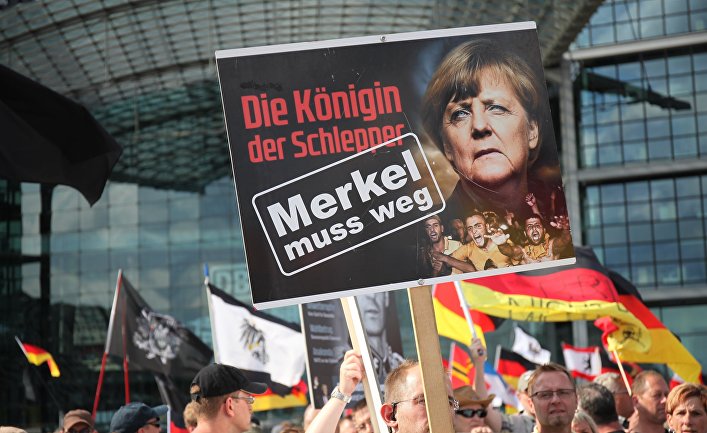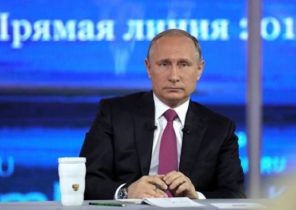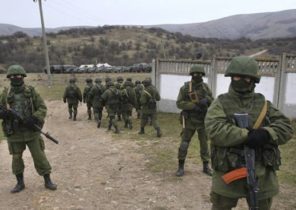
Terrorism, immigration crisis, the radicalization of political attitudes: such problems have to face in 2017 Western Europe. The interrelationship between politics and security in an unprecedented manner to strengthen and the external state and non-state forces will benefit from this fact.
In anticipation of the elections and terrorist attacks…
West European States waiting for a series of elections that could undermine the existing balance of political forces in many countries, as well as to reassess previous political preferences across the continent. In Germany and France increasingly heard opinion that the decisive factor in voter behavior at the ballot box will be probably the topic of security in the broadest sense of the word. Of particular importance are two of the most notable in Western Europe threats: terrorism and uncontrolled migration, which often provide each other a strong influence.
Moreover, there are real fears that as foreign non-state (e.g., terrorist organizations), and government forces there is a desire to intervene in the course of the campaigns and the subsequent process of adoption by the voters ‘ decisions: they can use different kinds of acts of violence or to provoke a new wave of illegal migration. Europe has already seen what kind of role can play a terrorist act in domestic politics, for example, Spain 2004. So powerful an instrument of pressure becomes blocking or sending masses of illegal immigrants towards the countries of Western Europe showed Turkey and the subsequent negotiations with the EU.
Non-state forces: potential motives
You should first consider why the force of private character (for example “Islamic state” (banned in Russia organization — approx. ed.)) may seek to coincide with a wave of terror to the upcoming elections in European countries. Looking at the issue from this perspective, you will notice that, in General, the biggest success for the terrorist organizations of different kinds to create a particular society or population of several countries the idea of the inevitability of danger for them. Because of this, despite the lack of funds, which does not allow them to do the classic blow to the army, police, secret services and so on, they can redirect their actions in the subjective sphere, influencing how the inhabitants of the so-called West appreciate the threat.
This goal can serve as the wave organized and planned and spontaneously carried out terrorist attacks or other acts of violence. As we now see, act of the terrorists has become easier, because they can’t stick to no rules in choosing their goals and methods of action. Additionally, the field of rapid exchange of information, for example, through the Internet, allows you to easily spread your own ideology, to inspire her people to radicalize and motivate them. In turn, years of deep social problems existing in Western countries (ghettoization and exclusion from public life of large groups of people), supply terrorists with human resources, allowing you to spread your ideas and to recruit. The effects of such a campaign of terror (serving part of a sophisticated operation, or running-inspired fanatics) can affect the development of political events in the short, medium and, most importantly, long term.
In the short term it will bring in the everyday life of residents of the West chaos and fear. Watching Islamist propaganda as “al-Qaeda” (banned in Russia organization — approx. ed.) and ISIS, you will notice the calls to strike at the most intimate sphere in which the average person oasis of safety: it houses, shopping malls, festivals, fairs, and so on. This form of attacks — thought-out and effective strategy, because people begin to feel that they can become a target of attack at any time regardless of their actions.
In response, some States have to introduce additional measures to protect critical urban points, transport hubs or places of a congestion of citizens, for example, the popular Christmas markets. The appearance of armed police and even military patrols does not reduce the level of subjective danger. You could even say that the unusual violence of the modern generation of Europeans, the effect is the opposite: they begin to feel that in close proximity a constant threat to their life and health.
Political leaders, in turn, begin to look for solutions to overcome this situation. Against this background, the major European parties, which are not offered radical ideas and positions, can lose its popularity. Voice will go to those who promote isolationism, careful steps in conflict-ridden regions, passivity in relation to terrorist threats outside of Europe, or, conversely, to emphasize the need to immediately deal with the threat.
Radical sentiments will increase. After all, the French, the Belgians or the Germans, like anxiously looking to the skies and fearing the attacks of unmanned vehicles to residents of Waziristan or Yemen, are beginning increasingly to look around, thinking, is there another nearby terrorist. The terrorists achieve the objective of attracting much less money and human resources. Because of their actions of the European States have to increase spending on its sprawling security apparatus, which is designed to introduce new procedures, monitoring of mass events, public transport and even movement in shopping malls. The question is whether modern Europeans are armed with patience and power, in the name of defending the old values and standards to withstand the next attacks.
If we consider the effects of the actions of terrorists in the medium term, it should be noted the revision of management position of individual States and agencies that deal with security in Europe. We are talking in particular about the relationship between state and citizen, which affect the above-mentioned sensitive to democratic States the scope of civil liberties. Here there are questions about the new powers of the security services, new procedures in the conduct of the police or army in the context of combating threats to internal security. The problem has a political aspect: different parties will try to incorporate into their programmes specific system solutions. To provide perspective, just look at the Polish debate around the Law on antiterrorist activity and correlate it with the real situation and the constant threat which exists in France, Belgium, Holland or Germany. At the same time we should remember that in Europe there are parties who rebel against the existing establishment.
Any radicalization of the public discourse, undoubtedly, is in the interests of terrorists. The stronger disagreements in the political arena of individual States, the harder it will be to reach consensus, and especially to take focus on the long term international action against the terrorists, especially outside of Europe. At the same time all acts of violence against Muslim communities, will contribute to their rapprochement with the Salafi movement. The Islamists themselves have long stress that they best kind of civil war in Europe: it will help them to exploit inclined to radicalism of the European residents and visitors, and give special freedom of action in the dissemination of ideology and the recruitment of new staff for operations on the continent and in other regions.
The security services and police will have to spray their human, financial and material capacity to follow many terrorist and radical groups (it can be both ultra-left and ultra-right forces), the ground for the appearance which will not only Islamism, but also internal political conflicts. The ability to prevent acts of violence occurring on ideological, religious or political grounds, will be thus limited, and Western Europe stand on the threshold of an era, reminiscent of the turn of 1960-70-ies, characterized by the growing wave of violence. The subjective feeling of threat will rise, one part of society will continue to be radicalized, and the other will go into apathy.
In the long-term transfer activities of terrorists on the territory of the countries of Western Europe could weaken the ability of politicians in any way to respond to this phenomenon. In conflict-ridden countries such organizations as al-Qaeda, ISIS and the like will have freedom of action, because people will find it difficult to explain the need for a political and military involvement in the solution of problems on foreign soil when their country itself is under threat. Actions will be limited, as now, sending warplanes or missiles to targets associated with these terrorist organizations. It’s difficult to hope that the Europeans will Wake up the same will to fight that the Americans after the events of 9 September 2011. What mood prevailed in American society, shows the fact that George W. Bush started two military operations, but was able to get re-elected.
The declining confidence in the private security agencies could also create a fertile environment for a variety of populist forces, which will offer light, but the radical methods of influence on the sources of threats (mass deportations, large-scale surveillance, including its own citizens) and would weaken faith in the values that underlie the European ideology. The result will be visible not only in politics or security but also, in particular, in the economy.
Describing in General terms the motives for the potential of non-state actors, we can say that in the coming year, with elections approaching, their activity is likely to increase. Violence on the streets is able to create new slogans in the political programs of parties and individual candidates, Recalling of different terrorist organizations. It fits perfectly into the phase of activity of ISIL, which is losing territory in Iraq and to a lesser extent in Syria. With violence the self-proclaimed Caliphate will implement its agenda in the political discourse of Western Europe and will be able to influence her political decisions. Will he do it purposefully, uniquely difficult to say, however, it can be assumed that he will benefit from all the political turmoil that will be caused by, perhaps, including new attacks.
State power: a potential explanation
If targeted action by non-state actors is uncertain, then the forces of the state, the situation is the opposite. It is possible to suggest that at least two States of destabilization in the security sphere will allow us to advance their interests. Turkey and Russia — States that (at least officially) faced the same threats and the same time quite clearly declared their disagreement with the decisions of the political elites of Western Europe, which affected their internal situation (an incident of the failed coup) or international position (sanctions against Russia over the annexation of Crimea and involvement in the conflict in the East of Ukraine). So radical political change in France or Germany can perfectly fit into a long-term strategy in these countries.
In the case of Turkey the main players, led by Germany, were in a situation of the hostages, violating the previous format of relations in which the EU and its major member countries played a leading role, and Ankara acted in the role of petitioner. However, the situation due to the migration crisis of 2015 and subsequent steps (especially the German Chancellor Angela Merkel), demanded the appearance of any diplomatic solutions, but in the end the game has changed. Now Turkey has received an instrument of influence on the political scene of most European countries of potential migrants. Their use in the next phase of the crisis may serve as a weakening entire countries and individual politicians, particularly Merkel. Turkish President Recep Tayyip Erdogan has long been known for its unforgiving. Western Europe had incurred a danger not only to those that took a passive position during the coup failed, but in the first place that raised the topic of the Kurds and criticized the violations of human rights in Turkey. With the approach of the next elections in Western Europe will be possible any scenario: from Turkey to Greece can once again sail the boat filled with illegal immigrants. Purpose, their way will be Germany, France and other countries. Such events will disrupt the status quo and become a breeding ground for all sorts of political structures that have criticized the leading political parties-right and center-left. In the future, Europe will have to sit at the negotiating table and agree on, perhaps even more courageous Turkish demands (including financial and economic), and at the same time to banish from public discussion, all official concerns about human rights violations, attacks on the Kurdish population or tightening of the regime in Turkey. Erdogan will have a great opportunity to achieve equal position with the key countries of the EU and to guarantee the freedom of action to the corresponding regional areas (Syria and Iraq).
You can nominate a second, more daring hypothesis (which should, however, take into consideration the past), suggesting that destabilization of European security on the eve of elections of 2017 will join Russia. It is not even about cyberattacks, because that threat is already directly stated the intelligence services of some countries, and other forms of activity. First and foremost, can recall the recorded and studied the methods of the companions of the Soviet secret police and the KGB, which were used in 1960-70-ies. In the period of actions aimed at destabilization of the situation in some NATO countries were receiving ideological and logistical support. There were supplies of arms, ammunition, explosives, and some of the terrorists were granted asylum. It’s difficult to hope that such activity was completely blocked.
Meanwhile, modern Russia is unlikely these methods with absolute precision, because it may fear to cause any diplomatic incident. A strategic reserve of it still remain, for example, Chechen structures are known for their loyalty to Vladimir Putin and a love for unusual actions, Ramzan Kadyrov. In this case, the boundary between irregular and, possibly, terrorist actions in different parts of the world was and still is very thin. In addition to the services of Kadyrov, there are many other courses of action, the basis for which can serve in a strong dependence on Russia, the Syrian intelligence services. The intelligence of Bashar al-Assad focuses too much on the struggle for survival of the regime in Damascus to think offensive, and they have human potential, held in a brutal prison, and terrorists who are fighting on the side of ISIS or other Islamist organizations. This combination of external and internal factors in combination with the operational capacity of the Russian security services enables various operations including those in Europe. They can include some kind of ideological inspiration and, of course, the information war. In this case it will be reduced to fear mongering and spreading ideas of the need to cooperate with Russia in such sensitive regions as Syria.
Every terrorist attack in the West, especially now on the eve of elections contributes to the strengthening of political forces (parties and organizations that play an active role in public-political sphere), which say that relations with Moscow should be normalized. Especially in the fight against Islamic terrorism, where the Russians could act as a kind of “partner” and “leader.” The forefront topics of terrorism and immigration crisis could serve as Western politicians the perfect excuse to change their rhetoric in relation to the events in Ukraine and even more — just the collision of the aspirations of Russia with her neighboring States. It will fit perfectly into a method, which is used by the Russian authorities, focusing on escalation, and then discharge another crisis to restore their spheres of influence outlined by President Putin (in particular, known in the history of the Munich security conference). From this we can assume that Moscow will not skilful attacks on the electoral system of Western Europe, and a climate of fear and radicalization of the broad masses of voters. The Russians has long been openly invested in both radical sides of the political scene, having considerable influence among the ultra-left and ultra-right forces. The depth of penetration in these structures, as it was during the cold war with the Communist parties and other leftist organizations, is difficult to assess. The less internal unity will be in Europe (especially Western ones), the easier it will be Russia to act in the political, economic, geopolitical, military and other fields. In addition, the fight against terrorism in Europe creates dissonance between the countries which call to restore the conventional defensive capabilities, and those who would like to focus on anti-terrorist activities.
An attempt to summarize
Unfortunately, terrorist attacks and other acts of violence that we saw in 2016, and that could happen in 2017, will have a direct impact not only on the subjective feeling of threat of the Europeans. They will find a direct reflection in specific policy decisions that may have long term consequences beyond the continent. Non-state forces have the ability to implement their strategic plans without involving considerable resources and a large number of people than has exposed all the weaknesses of European societies. At the same time state forces that are in some way interested in the destabilization of Europe, ready to enter the activities of non-state actors in their strategies. This is a very dangerous relationship that left an imprint, primarily on the political sphere: the relatively stable relations between the major parties will collapse, and the extreme position of unions will increase.
Before the elections in Germany and France, the issue of security will be a priority not only in the context of the ongoing fight against terrorists, but also maintain the stability of the political system. Anyway, starting in 2017 as in the sphere of security and policy will be an important indicator of how much Western companies are willing to minimize the importance of the factor of terrorist and immigration crisis, which contributes to their radicalization. Apparently, however, we will have to deal with the accumulation of different types of threats.







